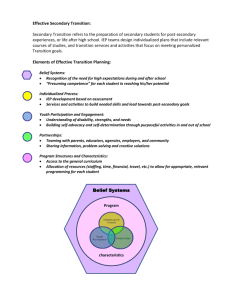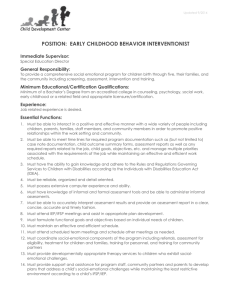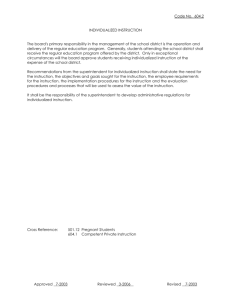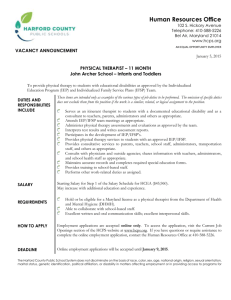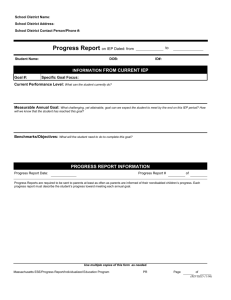Resources - Kansas Inservice Training System
advertisement
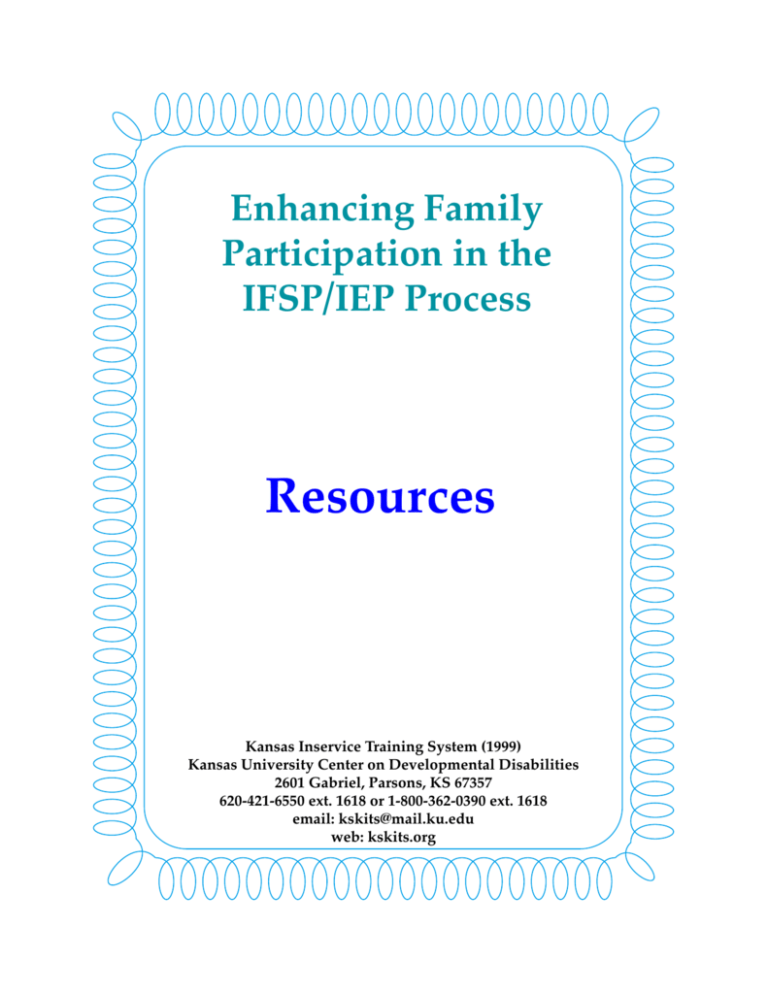
Enhancing Family Participation in the IFSP/IEP Process Resources Kansas Inservice Training System (1999) Kansas University Center on Developmental Disabilities 2601 Gabriel, Parsons, KS 67357 620-421-6550 ext. 1618 or 1-800-362-0390 ext. 1618 email: kskits@mail.ku.edu web: kskits.org Enhancing Family Participation in the IFSP/IEP Process Resource List Books Bateman, B. D., & Linden, M. A. (1998). Better IEPs: How to develop legally correct and educationally useful programs (3rd. ed.), Longmont, CO: Sopris West. *Beckman, P. J., Boyes, G. B., & Herres, A. (1993). The IEP and IFSP meetings. In P. J. Beckman & G. B. Boyes (Eds.), Deciphering the system: A guide for families of young children with disabilities (pp. 81-100). Cambridge, MA: Brookline Books. Beckman, P., Newcomb, S., Frank, N., Brown, L., Stepanek, J., & Barnwell, D. (1996). Preparing personnel to work with families. In D. Bricker & A. Widerstrom (Eds.), Preparing personnel to work with infants and young children and their families: A team approach (pp. 273-294). Baltimore, MD: Paul H. Brookes. *Bricker, D., & Cripe, J. (1992). Development of goals and objectives. In An activity-based approach to early intervention (pp. 87-105). Baltimore, MD: Paul H. Brookes. *Bricker, D., Pretti-Frontczak, K., & McComas, N. (1998). A linked systems approach. In An activitybased approach to early intervention (2nd ed.) (pp. 23-54). Baltimore: Paul H. Brookes. Cook, R. E., Tessier, A., & Klein, M. D. (1996). Implementing intervention and instructional strategies. In Adapting early childhood curricula for children in inclusive settings (pp. 175-206). Englewood Cliffs, NJ: Merrill. Davis, M. D., Kilgo, J. L., & Gamel-McCormick, M. (1998). Using individualized plans as a basis for designing developmentally appropriate learning experiences for young children with special needs. In Young children with special needs: A developmentally appropriate approach (pp. 105-146). Boston: Allyn and Bacon. *Division for Early Childhood Task Force on Recommended Practices. (1993). DEC recommended best practices: Indicators of quality in programs for infants and young children with special needs and their families. Pittsburgh, PA: DEC Executive Office. Fuchs, L., & Shinn, M. (1989). Writing CBM IEP objectives. In M. Shinn (Ed.), Curriculum-based measurement: Assessing special children (pp. 130-152). New York: Guilford Press. Gaylord-Ross, R., & Holvoet, J. (1985). Making the curriculum natural and functional. In R. Gaylord-Ross & J. Holvoet (Eds.), Strategies for educating students with severe handicaps (pp. 89-124). Boston: Little, Brown, & Co. * **Hull, K., Capone, A., Giangreco, M. F., & Ross-Allen, J. (1996). Through their eyes: Creating functional, child-sensitive individualized education programs. In Rethinking pull-out services in early intervention: A professional resource (pp. 103-120). Baltimore, MD: Paul H. Brookes. (ECRC catalog number PM-836) *McWilliam, R. A. (1996). Rethinking pull-out services in early intervention: A professional resource. Baltimore, MD: Paul H. Brookes. *Salisbury, C. (1992). Parents as team members: Inclusive teams, collaborative outcomes. In B. Rainforth, J. York & C. Macdonald, (Eds.), Collaborative teams for students with severe disabilities: Integrating therapy and educational services (pp. 43-66). Baltimore, MD: Paul H. Brookes. Safer, N., & Hamilton, J. (1993). Legislative context for early intervention services. In W. Brown, K. Thurman, & L. Pearl (Eds.), Family centered early intervention with infants and toddlers: Innovative crossdisciplinary approaches (pp. 1-18). Baltimore, MD: Paul H. Brookes. Turnbull, A. P., & Turnbull, H. R. (1990). Family participation in developing the IEP. In Families, professionals, and exceptionality: A special partnership (2nd edition) (pp. 268-303). Columbus, OH: Merrill. Journal Articles Able-Boone, H. (1993). Family participation in the IFSP process: Family or professionally driven. InfantToddler Intervention: A Transdisciplinary Journal, 3(1), 63-71. Bailey, D. B., Jr. (1990). Parent’s perspectives on a written survey of family needs. Journal of Early Intervention, 14(3), 196-203. Bailey, D. B., Jr., Buysse, B., Smith, T., & Elam, J. (1992). The effects and perceptions of family involvement in program decisions about family-centered practices. Evaluation and Program Planning, 15, 23-32. Bailey, D. B., Jr., Winton, P. J., Rouse, L., & Turnbull, A. P. (1990). Family goals in infant intervention: Analysis and issues. Journal of Early Intervention, 14(1), 15-26. Beckman, P. J., & Bristol, M. (1991). Issues in developing the IFSP: A framework for establishing family outcomes. Topics in Early Childhood Special Education, 11(3), 19-31. Campbell, P. (1991). Evaluation and assessment in early intervention for infants and toddlers. Journal of Early Intervention, 15(1), 36-45. Campbell, P., Strickland, B., & LaForme, C. (1992). Enhancing parent participation in the Individualized Family Service Plan. Topics in Early Childhood Special Education, 11(4), 112-124. Decker, B. (1992). A comparison of the Individualized Education Plan and the Individualized Family Service Plan. The American Journal of Occupational Therapy, 46(3), 247-252. Dunst, C. J., Johanson, D., Trivette, C. M., & Hamby, D. (1991). Family-oriented early intervention policies and practices: Family-centered or not? Exceptional Children, 58, 115-126. Fewell, R., Synder, P., Sexton, D., Bertrand, S., & Hockless, M. (1991). Implementing IFSPs in Louisiana: Different formats for family-centered practices under Part H. Topics in Early Childhood Special Education, 11(3), 54-65. Goodman, J. F., & Hover, S. A. (1992). The Individualized Family Service Plan: Unresolved problems. Psychology in the Schools, 29, 140-151. Lynch, E. W. (1982). Perspectives on parent participation in special education. Exceptional Education Quarterly, 3(2), 56-63. Moroz, K. J., & Allen-Meares, P. (1991). Assessing adolescent parents and their infants: Individualized family service planning. Families in Society: The Journal of Contemporary Human Services, 10(1), 461-467. Nash, J. K. (1990). Public Law 99-457: Facilitating family participation on the multidisciplinary team. Journal of Early Intervention, 14(4), 318-326. Notari, A., & Bricker, D. (1990). The utility of a curriculum-based assessment in the development of Individualized Education Plans for infants and young children. Journal of Early Intervention, 14(2), 117-132. Notari, A., & Drinkwater, S. (1991). Best practices for writing child outcomes: A evaluation of two methods. Topics in Early Childhood Special Education, 11(3), 92-106. **Notari-Syverson, A. R. & Shuster, S. L. (1995, Winter). Putting real-life skills into IEP/IFSPs for infants and young children. Teaching Exceptional Children, 27 (2), 29-32. Pugach, M. (1982). Regular classroom teacher involvement in the development and utilization of IEPs. Exceptional Children, 48, 371-374. Sexton, D., Synder, P., Rheams, T., Barron-Sharp, B., & Perez, J. (1991). Considerations in using written surveys to identify family strengths and needs during the IFSP process. Topics in Early Childhood Special Education, 11(3), 81-91. Slentz, K. L., & Bricker, D. (1992). Family-guided assessment for IFSP development: Jumping off the family assessment bandwagon. Journal of Early Intervention, 16(1), 11-19. Smith, S. (1990). Individualized Education Programs (IEPs) in special education: From intent to acquiescence. Exceptional Children, 57(1), 6-14. Smith, S., & Simpson, R. (1989). An analysis of Individualized Education Programs (IEPs) for students with behavior disorders. Behavioral Disorders, 14, 107-116. Summers, J. A., Dell’Oliver, C., Turnbull, A. P., Benson, H. A., Santelli, E., Campbell, M., & Sigel-Causey, E. (1990). Examining the Individualized Family Service Plan process: What are family and practitioner preferences? Topics in Early Childhood Special Education, 10(1), 78-99. Winton, P. J., & Bailey, D. B. (1988). The family-focused interview: A collaboration mechanism for family assessment and goal-setting. Journal for the Division of Early Childhood, 12(3), 197-207. York, J., & Vandercook, T. (1991). Designing an integrated program for learners with severe disabilities. Teaching Exceptional Children, 23(2), 22-28. Video Tapes Cripe, J., & Graffeo, J. (1995). A family’s guide to the Individualized Family Service Plan. [video tape and manual]. Baltimore, MD: Paul H. Brookes. Elsayed, S.S., Maddux, L.E., & Bay, C.S. (1993). Family and the IFSP Process. [video tape and manual]. Baltimore, MD: Kennedy Krieger Institute. Kennedy Krieger Institute (1991). Delivering family-centered, home-based services: A training program. [video tape and facilitator’s guide]. Baltimore, MD: Author. *These resources can be borrowed from the Early Childhood Resource Center (ECRC) 2601 Gabriel, Parsons, KS 67357 620-421-6550 ext. 1651 email: resourcecenter@ku.edu web address: www.kskits/ecrc **These articles are included in the hard copy version of this packet.

